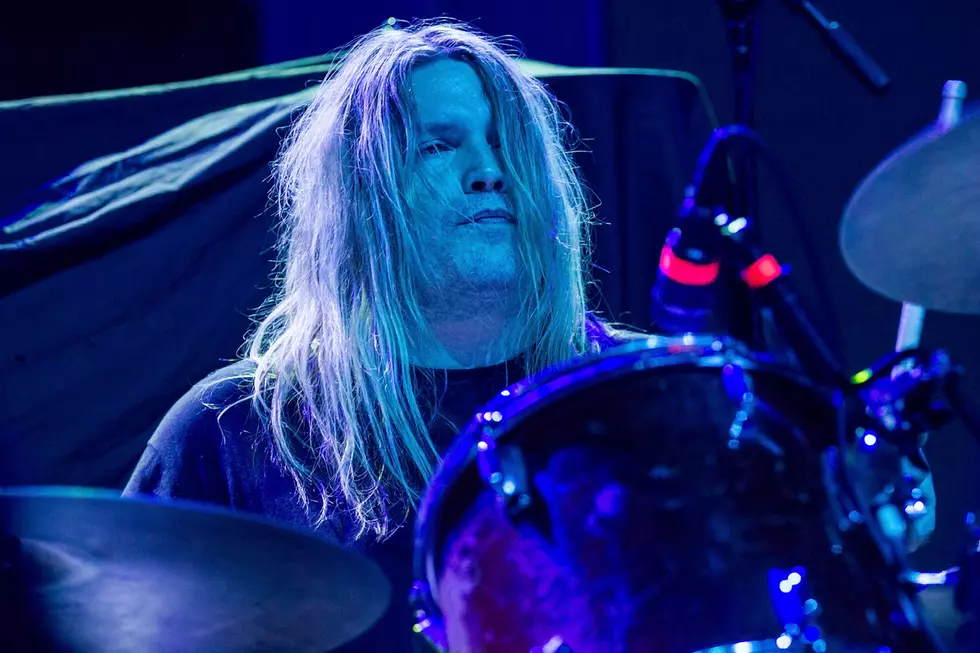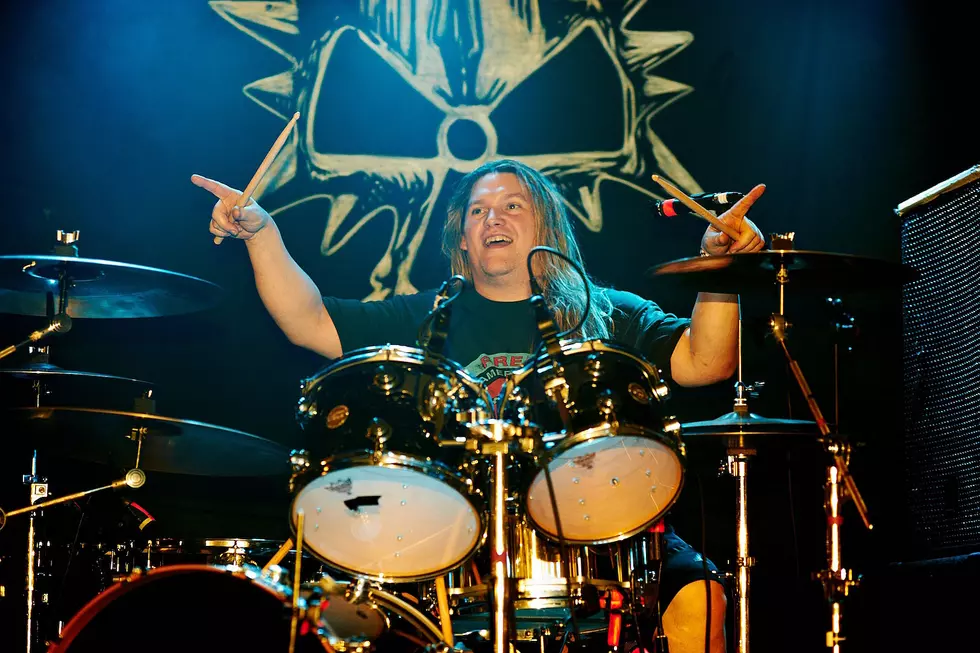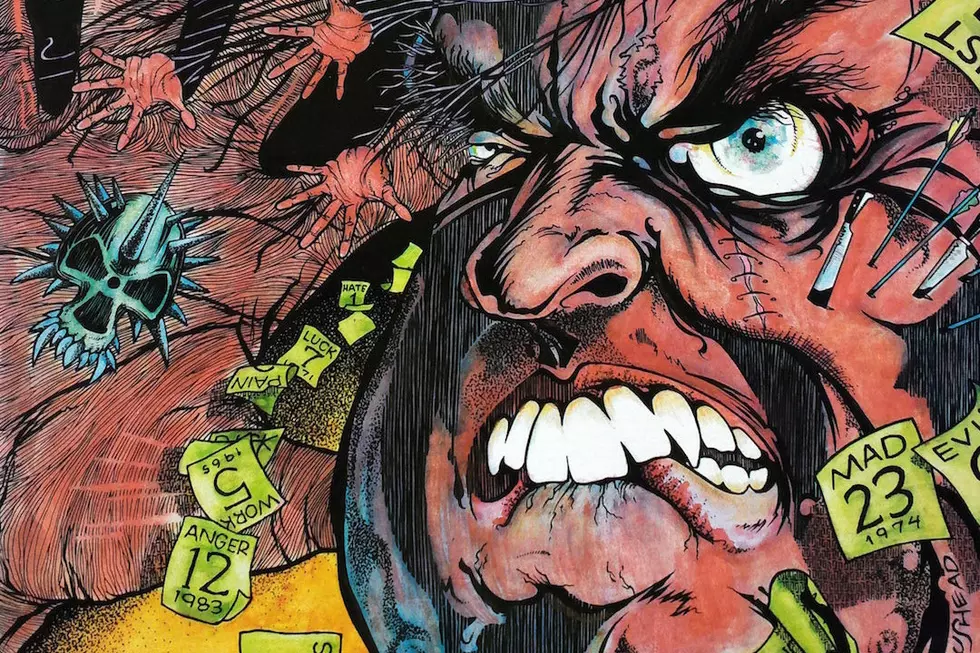
How Corrosion of Conformity Proved They Belonged With ‘Wiseblood’
With 1996's Wiseblood, Corrosion of Conformity proved they could not only survive, but also thrive and retain their integrity in the big leagues. While making the record, they fought off a major label pressuring them to use outside songwriting help, and made friends with a metal legend who would help introduce their music to countless new fans.
As Corrosion of Conformity's steady evolution from hardcore purists to southern-tinged heavy metal pioneers attests, the Raleigh, N.C.-bred group has never been afraid of change. The most important thing, according to drummer Reed Mullin, is that they just enjoy making music together.
"Half of my life I've been in this band. I was 15 or 16 when we began," Mullin explained in a 1997 interview. "Me and [guitarist] Woody [Weatherman] started playing music together in high school and we've never quite stopped. Actually, Woody was the one who taught me to play drums. We like to play, plain and simple. I think that's a testament to the fact that we've been around for as long as we have."
Current guitarist and lead vocalist Pepper Keenan had a unique, outside perspective on Corrosion of Conformity's early days. He watched as the band released their first three albums with a rotating cast of singers, including current bassist Mike Dean (who also fronted a three-piece version of the band for 2012's self-titled album and 2014's IX while Keenan was occupied as the guitarist in Down). Keenan eventually joined the band in 1989 as a second guitarist, making his recorded debut on 1991’s Blind, which found the group shifting in more of a sludgy stoner metal direction.
"Before I joined the band, I'd seen C.O.C., in the hardcore world that I was in at the time, as a pretty progressive band," Keenan said in a 2000 interview. "You could tell that C.O.C. wasn't the average band in that genre. Once I hooked up with the guys, we discussed how the hardcore scene was getting very stale. What made the hardcore scene so cool in the beginning was this flow of ideas and attitude that was uncharted. We had always wanted to keep pushing that parameter. When you grow up playing that shit, you always carry it with you. So we always had the idea to expand it and see how far we could push it. And that's been the basis of Corrosion of Conformity, to not be scared to try different things."
He shifted into the role of lead vocalist for 1994’s Deliverance, the band's first release for Columbia Records. As Mullin notes, moving into the major label arena was a bit of an adjustment for the group.
“We were so frugal our whole lives because we were a punk rock, D.I.Y band. At least, that was our mindset. Then, all of a sudden, we’re on this major label, and they’re wasting money left and right. We couldn’t believe it. So we tried to do everything on the cheap, and finally our A&R guy [Jim Welch] came to us,” Mullin recalled in a 2016 interview.
"He signed us for our deal with Columbia, but before that he had signed us to Relativity to do the Blind album and even before that did hardcore shows in Boston," Mullin said. "He took us aside and said, 'Look, guys, I totally understand what you’re doing' – because he’s an old punk rocker too – 'but it’s kind of important that you spend money, cuz the more invested they are, the less likely they’ll, if for whatever reason Deliverance doesn’t meet whatever those standards are for a hit album, let you go.' So then we just kinda let them spend money.”
The strategy worked and Deliverance was well-received. Anyone worried that Corrosion of Conformity might soften up their sound with further major label dollars and influence on the next record had another thing coming as opener “King Of The Rotten” kicked into gear on Wiseblood, which was released in 1996. Keenan says that they came into the sessions for the album fully loaded for bear and ready to go.
“We were pretty on point. We had just finished doing a bunch of touring and we did some of the shit at Criteria, we did some of the stuff in New Orleans, we finished at Electric Lady in New York,” he told UCR in a 2015 interview. “It was a strong record, man. It’s still one of my favorites. And the way it sounds is pretty brutal as well.”
Wiseblood got a substantial amount of airplay at rock radio with “Drowning In a Daydream,” which features a sinister lead vocal from Keenan and a memorably mean groove. It might have had an extra layer of polish that made it just a little bit more attractive for radio, but it was far from Corrosion of Conformity selling out. They had already vetoed those kinds of ideas in discussions with Columbia as the album was in progress.
“I’ll tell you the God’s honest truth. We turned the record in and that song was not on the record. Donnie Ienner, the president of Columbia at the time said that he didn’t hear a hit on that album, which I thought he was crazy,” Keenan recalls. “But it was just an abrasive sounding record, so he didn’t hear a hit. He wanted us to write a song with like some songwriter dude who wrote Aerosmith songs or some shit and we were like, ‘Fuck that!’ I said, ‘You want a fuckin’ hit? I’ll give you a fuckin’ hit.’
Listen to Corrosion of Conformity Perform 'Drowning In a Daydream'
"We went back in the studio and wrote ‘Drowning In a Daydream’ in two days, recorded it and sent it back to him," Keenan said with a laugh. "We put it on the record and he still wasn’t convinced and then his secretary put it on the list for the Grammy nominations without telling anybody. We got nominated for a fuckin’ Grammy because of his secretary, which was very ironic. And it got tons of radio airplay, so, whatever.”
Keenan stands by “Daydream” to this day, even though it’s been largely absent from the band’s setlist at recent shows. “It’s a great song. I’m not a one-trick pony and nor does C.O.C. try to be,” he says. “We’re writing songs. If you want to write a song, I’ll fuckin’ write something like ‘Stare Too Long’ or whatever. I enjoy the challenge of that stuff. I like ‘Drowning In A Daydream’ a lot. It’s always been one of my favorites.”
By 1996, producer John Custer had become a vital cog in Corrosion of Conformity's album-making process. Wiseblood was his third album working with the group – a relationship which continues to this day.
“He’s just one of those guys who looks at ya and you know, after you’ve worked on something, he’s a fantastic musician and understands it psychologically and he’ll ask the simple question, ‘Is that what you hear in your head?’ And if it’s not, we keep going until we get it,” Keenan says. “That’s all you can really ask for from a guy, a producer like that, of that caliber. And he doesn’t try and put his stamp on things. We don’t go around shaping the song, we just let it evolve.”
“We only ventured out once in the last 25 years and went with a different producer, and it went horribly wrong. I won’t mention any names, but he worked with Everlast. I think he just didn’t understand us,” Mullin says. “And that’s the thing about John Custer; he does understand us. And not only is he a super badass producer, but he’s a musician as well. And the production value he brings to us is not just having studio smarts to turn knobs – though I guess you don’t turn knobs anymore – click a mouse or whatever the fuck.
"He’s been working with us since 1991," Mullin adds. "He gets the best out of us, and the whole process he makes electric. Every step of the way he challenges us. He knows our personalities so well. He knows how to push us but keep everything fun. We’re always on the edge of our seat. We don’t know what the fuck he’s gonna come up with.”
Metallica’s James Hetfield shows up on “Man or Ash,” a guest appearance which Keenan explains just happened spontaneously. Hetfield also turned out to be an important influence both during the making of the album and after it was released.
“We were actually mixing that record in New York and Metallica was mixing one of their records in New York and me and Het were hanging out on a daily basis," Keenan says. "We’d meet at a little bar in Manhattan and just talk about the day’s events and how everything was going. We struck up a good friendship and he helped out on a song on that record and it just went from there,” Keenan says. “He actually got the guy [Mike Fraser] to mix the record for us that was a guy who had mixed some live Metallica stuff.
"So he set that up as well – and we just went from there," Keenan says. "The next thing I know, it was like, 'Do you guys want to go on tour with us?,' and I was like, 'Are you fuckin’ with me?' That was another thing that Columbia was pissed about. You know, the record was too harsh, didn’t have a hit, we wrote a fuckin’ hit, we got nominated for a Grammy and then Hetfield offers us a three year tour with Metallica. Everything they were seeing was fuckin’ wrong. It was bizarre. They were like, 'What do you mean you’ve got a three-year tour with Metallica?' They were trying to kill it, because they didn’t fuckin’ like the record.”
Looking back on Wiseblood, Keenan says that overall, it was an “awesome time," and that he’s got no hard feelings towards Columbia, with whom the band parted company before the release of their next album, 2000's America's Volume Dealer.
“They were great to us,” Keenan says. “They gave us a lot of freedom to do what we wanted to do and really went above and beyond. But if you’re not the flavor of the month on a major label, your time is gone. It’s pretty simple. Green Day was moving in and all of that shit was happening. Offspring was a new big deal. I remember that.”
The Top 50 Heavy Metal Albums
More From Ultimate Classic Rock









